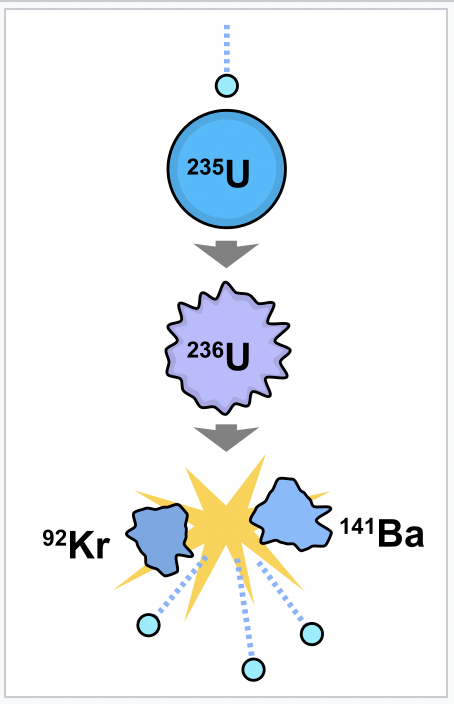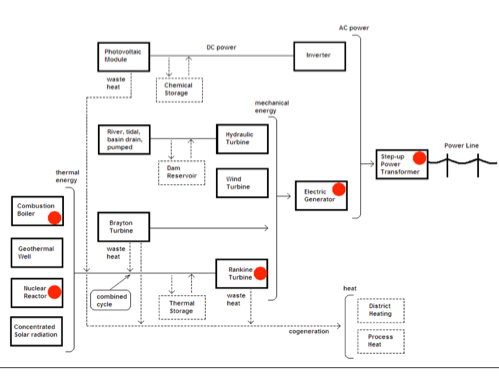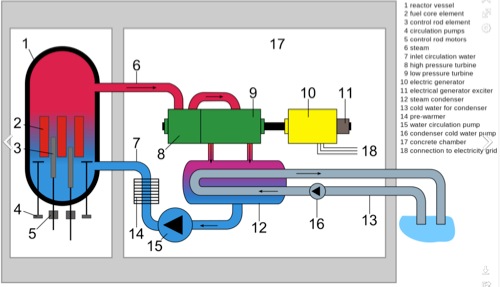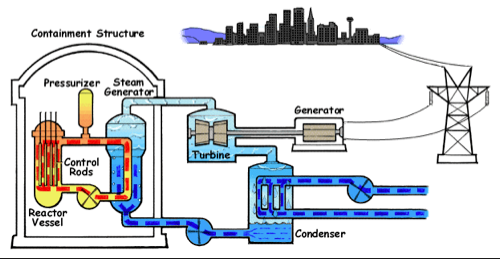Non-renewable: not renewable in your lifetime
Coal, oil, natural gas and nuclear-------
Fossil fuels:
- Coal: dirtiest of all of these, includes heavy metals (e.g. mercury), sulfur and others, creates toxic soot when burned, high energy content, but also high CO2 content, 1 kg of coal produces ~3 kg of CO2, produced by decaying plants under pressure without oxygen in stages: peat->lignite->bituminous->anthracite->(diamond). Anthracite is the cleanest (less Sulfur) and holds the most energy (almost pure carbon). Sulfur comes from the amino acid methionine, present in the plants.
- Oil : from decayed diatoms or other organics, formed under pressure without oxygen, but includes hydrogen, so is called a "hydrocarbon" with formula CnHx and C-H structures. Known as "Petroleum" or "stone oil". Can have less sulfur than coal ("sweet" crude oil), and can be refined into everything from light gasoline to heavy tar for roads. Burns in the air to produce water and CO2.
- Natural Gas: from decaying organic matter, in gaseous form at room temperature and pressure, often found above oil in reservoirs. Lowest in sulfur and other toxins than the other fossil fuels, burns cleaner, with most energy per molecules of CO2 released. All are forms of the C-H molecule, usually ending in -ane:
- methane: CH4
- ethane: C2H6
- propane: C3H8
- butane: C4H10
- pentane: C5H12
- hexane: C6H14
- heptane: C7H16
- octane: C8H18
- Nuclear power: where chemical energy involves molecular bonds and the movement of electrons, nuclear energy involves the bonds within the nucleus, called "binding energy". Two main forms:
- Fission or "splitting" of large atoms. Usually involves Uranium 235/92 or some other heavy isotope, splitting into smaller bits like Barium and Krypton (the stuff that kills superman). All nuclear power plants producing energy on our grids are fission reactors of several types:
- BWR or boiling water reactors: more dangerous but cheaper, has one cooling loop
- PWR or pressurized water reactors: safer, more common, has a primary and secondary cooling loop

- Fusion or "joining" of lighter atoms, usually hydrogen or helium. This is the process that produces energy in the sun and other stars. Not practically useful at this stage for energy, but is used for thermonuclear weapons (H-bombs). Much more powerful than Fission.

What is common in each of these? HEAT
Keep in mind: all new technology builds on old technology...
so...
Think of steam engines (choo-choo!), which use expanding steam to push a piston and make the train go. Boiling the water could use wood, coal or oil to produce heat.
All older electrical power plants use coal, oil, natural gas or nuclear power to boil steam and instead of pushing a piston, they shoot the steam over a turbine (looks like the front of a jet engine, which is a jet-turbine or "turbo-jet").
Imagine instead of spinning the blades on your typical 747 jet engine, that spinning stuff turned a humongous generator.
That's how most electrical power is generated in this country.
Natural gas is different: instead of boiling water to make steam to shoot over the spinning turbine, they just shoot the burning natural gas over the turbines, just like in a jet engine, so much faster than boiling water to make steam.
So?
Natural gas is fast becoming the best source for electrical production because the power of the turbine can change in seconds instead of minutes, meaning it can "follow" other renewable energy sources such as solar and wind.
Natural gas is also cleaner, safer and easier to deal with than the others, and because of fracking, it is much cheaper than coal or oil.
Fracking is hydraulic fracturing, where a toxic cocktail of chemicals is injected into an oil well, then hammered down to break up underground formations, releasing trapped natural gas. This toxic cocktail can then pollute the environment, and fracking impacts earthquakes and the release of gases into the water table, impacting humans.
Hubbert Curve:
All fossil fuels are limited in capacity, and if all were burned, our atmosphere would look more like Mars, or mostly CO2.
Hubbert was a geologist who predicted "peak oil" or the peak of economic oil extraction.
This means there is less "easy oil", so oil could be drilled and extracted, but the price would be huge.
Nuclear fuels are less limited, but dealing with the waste they produce is a huge issue, as is the design of nuclear plants, which were just scaled up versions of nuclear power plants in submarines, which are surrounded by water and shielded from the Navy submariners.
Three major nuclear accidents you need to know about:
- Three Mile Island: 1979, Pennsylvania, radioactive core meltdown of power plant, released some radioactive gases, site is toxic to humans for thousands of years. Not even robots can go in there even today.
- Chernobyl: Ukraine 1986, radioactive core exploded during an illegal test, killing 30 on the spot, many millions impacted by cancer, hundreds by radiation poisoning, core remnants still radioactive
- Fukushima-Daiichi: Japan, 2011, earthquake and tsunami overwhelmed the plant, causing pump failure and meltdown of the radioactive core, many people poisoned by radiation long term, still in progress, TEPCO (Tokyo electric power company) is still not telling the truth about the impact of this.
All heat driven plants (excluding natural gas turbines) need to be located near a water source for cooling, which creates thermal pollution. Where water is not available, cooling towers are used to cool the steam for re-use.
Summary:

Fossil and nuclear electrical power plants:

Nuclear reactors:
Boiling water reactor (BWR):

Pressurized nuclear reactor (PWR):

/groups/apenvironmentalscience/search/index.rss?tag=hotlist/groups/apenvironmentalscience/search/?tag=hotWhat’s HotHotListHot!?tag=hot6/groups/apenvironmentalscience/sidebar/HotListadminadmin2020-08-19 15:43:59+00:002020-08-19 15:43:59updated30adminadmin2011-09-08 21:36:21+00:002011-09-08 21:36:21updated29adminadmin2011-08-24 23:20:40+00:002011-08-24 23:20:40updated28adminadmin2011-08-24 22:42:36+00:002011-08-24 22:42:36updated27adminadmin2011-08-22 02:41:09+00:002011-08-22 02:41:09updated26adminadmin2011-08-22 02:40:02+00:002011-08-22 02:40:02updated25adminadmin2011-08-21 20:39:11+00:002011-08-21 20:39:11updated24adminadmin2011-08-21 20:30:42+00:002011-08-21 20:30:42updated23adminadmin2011-08-21 20:30:13+00:002011-08-21 20:30:13updated22adminadmin2011-08-21 20:25:48+00:002011-08-21 20:25:48updated21adminadmin2011-08-21 20:25:18+00:002011-08-21 20:25:18updated20adminadmin2011-08-21 00:22:12+00:002011-08-21 00:22:12updated19adminadmin2011-08-21 00:18:56+00:002011-08-21 00:18:56updated18adminadmin2011-08-21 00:15:43+00:002011-08-21 00:15:43updated17adminadmin2011-08-21 00:12:37+00:002011-08-21 00:12:37updated16adminadmin2011-08-21 00:12:02+00:002011-08-21 00:12:02updated15adminadmin2011-08-20 23:59:41+00:002011-08-20 23:59:41updated14Added tag - hotadminadmin2011-08-20 23:59:38+00:002011-08-20 23:59:38addTag13Added tag - conservationadminadmin2011-08-20 23:59:32+00:002011-08-20 23:59:32addTag12Added tag - critical thinkingadminadmin2011-08-20 23:59:19+00:002011-08-20 23:59:19addTag11Added tag - ch1adminadmin2011-08-20 23:59:08+00:002011-08-20 23:59:08addTag10Added tag - sustainabilityadminadmin2011-08-20 23:59:05+00:002011-08-20 23:59:05addTag9adminadmin2011-08-20 20:47:39+00:002011-08-20 20:47:39updated8adminadmin2011-08-20 20:46:15+00:002011-08-20 20:46:15updated7adminadmin2011-08-20 20:43:07+00:002011-08-20 20:43:07updated6adminadmin2011-08-20 19:14:13+00:002011-08-20 19:14:13updated5adminadmin2011-08-20 19:11:26+00:002011-08-20 19:11:26updated4adminadmin2011-08-20 18:59:57+00:002011-08-20 18:59:57updated3adminadmin2011-08-20 18:56:59+00:002011-08-20 18:56:59updated2First createdadminadmin2010-11-07 01:41:28+00:002010-11-07 01:41:28created1wiki2020-08-19T15:43:59+00:00groups/apenvironmentalscience/wiki/welcomeFalseCh01 Overview/groups/apenvironmentalscience/wiki/welcome/Ch01_Overview.htmladmin30 updatesCh01 Overview
Welcome to our APES wiki. You should be able to do the following after logging in with your account:
To create a new page, click the ...Falseadmin2020-08-19T15:43:59+00:00adminadmin2013-02-05 02:24:03+00:002013-02-05 02:24:03updated4Added tag - hotadminadmin2013-02-05 02:24:02+00:002013-02-05 02:24:02addTag3adminadmin2013-02-05 02:05:35+00:002013-02-05 02:05:35updated2First createdadminadmin2013-02-05 02:03:35+00:002013-02-05 02:03:35created1wiki2013-02-05T02:24:03+00:00groups/apenvironmentalscience/wiki/394a8FalseEnergy notes/groups/apenvironmentalscience/wiki/394a8/Energy_notes.htmladmin4 updatesEnergy notes
Week of 2.4.13: energy wrap-up
e2 video: coal vs. nuclear in class
AP exams: FRQ
2002.1
2004.2
2006.1
2007.2
2008.1
...Falseadmin2013-02-05T02:24:03+00:00adminadmin2013-02-05 02:23:20+00:002013-02-05 02:23:20updated6Added tag - hotadminadmin2013-02-05 02:23:18+00:002013-02-05 02:23:18addTag5adminadmin2013-02-05 02:23:12+00:002013-02-05 02:23:12updated4adminadmin2013-02-05 02:21:48+00:002013-02-05 02:21:48updated3adminadmin2013-02-05 02:20:26+00:002013-02-05 02:20:26updated2First createdadminadmin2013-02-05 02:06:00+00:002013-02-05 02:06:00created1wiki2013-02-05T02:23:20+00:00groups/apenvironmentalscience/wiki/c360bFalseFeb-May plan/groups/apenvironmentalscience/wiki/c360b/FebMay_plan.htmladmin6 updatesFeb-May plan
1. conclusion of energy chapters (see previous wiki)
2. GCC AP questions FRQ:
2006.2
2005.3
2005.4
2007.3
...Falseadmin2013-02-05T02:23:20+00:00adminadmin2012-03-07 05:53:55+00:002012-03-07 05:53:55updated14adminadmin2012-03-07 05:43:38+00:002012-03-07 05:43:38updated13adminadmin2012-03-07 05:41:35+00:002012-03-07 05:41:35updated12adminadmin2012-03-07 05:38:57+00:002012-03-07 05:38:57updated11Added tag - hotadminadmin2012-03-07 05:38:55+00:002012-03-07 05:38:55addTag10adminadmin2012-03-07 05:36:47+00:002012-03-07 05:36:47updated9adminadmin2012-03-07 05:22:26+00:002012-03-07 05:22:26updated8adminadmin2012-03-07 05:20:01+00:002012-03-07 05:20:01updated7adminadmin2012-03-07 05:18:58+00:002012-03-07 05:18:58updated6adminadmin2012-03-07 04:58:55+00:002012-03-07 04:58:55updated5adminadmin2012-03-07 04:57:33+00:002012-03-07 04:57:33updated4adminadmin2012-03-07 04:56:53+00:002012-03-07 04:56:53updated3adminadmin2012-03-07 04:54:20+00:002012-03-07 04:54:20updated2First createdadminadmin2012-03-07 04:53:33+00:002012-03-07 04:53:33created1weblog2012-03-07T05:53:55+00:00groups/apenvironmentalscience/weblog/de030FalseGreen Apple/groups/apenvironmentalscience/weblog/de030/Green_Apple.htmladmin14 updatesGreen Apple
Team,
Please watch this video about NYC:
Trailer:
http://www.pbs.org/e2/episodes/101_the_green_apple_trailer.html
On the server:
http://physics.hpa...Falseadmin2012-03-07T05:53:55+00:00adminadmin2011-09-13 19:08:24+00:002011-09-13 19:08:24updated4Added tag - hotadminadmin2011-09-13 19:08:22+00:002011-09-13 19:08:22addTag3adminadmin2011-09-13 19:08:10+00:002011-09-13 19:08:10updated2First createdadminadmin2011-09-13 19:04:30+00:002011-09-13 19:04:30created1weblog2011-09-13T19:08:24+00:00groups/apenvironmentalscience/weblog/4ecddFalseQuestions for Wednesday, wiki adds/groups/apenvironmentalscience/weblog/4ecdd/Questions_for_Wednesday_wiki_adds.htmladmin4 updatesQuestions for Wednesday, wiki adds
Team,
I'd like to try something for class tomorrow: each of you to create a question from chapter 3, and email it to me by this evening (Tuesday). Pl...Falseadmin2011-09-13T19:08:24+00:00hot/groups/apenvironmentalscience/search/index.rss?sort=modifiedDate&kind=all&sortDirection=reverse&excludePages=wiki/welcomelist/groups/apenvironmentalscience/search/?sort=modifiedDate&kind=all&sortDirection=reverse&excludePages=wiki/welcomeRecent ChangesRecentChangesListUpdates?sort=modifiedDate&kind=all&sortDirection=reverse&excludePages=wiki/welcome0/groups/apenvironmentalscience/sidebar/RecentChangesListmodifiedDateallRecent ChangesRecentChangesListUpdateswiki/welcomeNo recent changes.reverse5searchlist/groups/apenvironmentalscience/calendar/Upcoming EventsUpcomingEventsListEvents1Getting events…
Comments